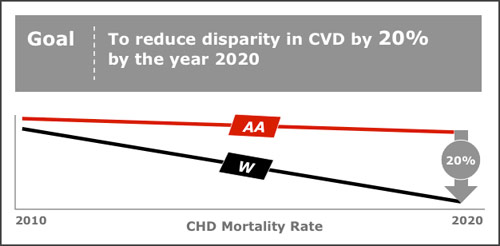 Three hundred years ago the majority of us of African descent would have been slaves. Now we have CEOs of major fortune 500 companies; we have had tremendous success in sports and entertainment; and who would have thought we would have an African American living in the White House?
Three hundred years ago the majority of us of African descent would have been slaves. Now we have CEOs of major fortune 500 companies; we have had tremendous success in sports and entertainment; and who would have thought we would have an African American living in the White House?
However, this progress could make us complacent or, worse, blind to the need that still exists. In spite of the victories, many have not benefited. The disparity in health outcomes emphasizes this point: that all is not what it seems.”
— Dr. Marcus L. Williams, Past President of the ABC

Health Care Disparities
- African American (AA) men are 76% more likely to die of stroke, while AA females are 54% more likely.
- AA men and women have a higher prevalence of hypertension and diabetes.
- AA have a higher mortality rate for Cardiovascular Disease (CVD).
- AA are less likely to be treated according to evidence based guidelines.
- AA are 3 times more likely to be operated on by a “high risk” surgeon.
- Over 50% of the Hispanic elderly are cared for by 5% of American hospitals.
- Some American Indian tribes have over 50% occurrence of diabetes.
- Death rate for heart disease was 40% higher in poor men compared to wealthier ones.
- View Heart and Stroke Statistics from the American Heart Association
ABC 2020 Targets for 20% Reduction
- Mortality from CAD
- Mortality from Stroke
- Patient behavior/outcomes
- Smoking cessation
- BMI < 25 Kg/m2
- Physical activity as exercise
- Dietary changes
- Total Cholesterol < 200 mg/dL
- Blood Pressure < 130/80 mmHg
- Glucose < 100 mg/dL
Health Care Disparities In Resources
- Lost Physician Revenue means lost patient access
- Man power shortage for cardiologists in certain ethnic groups
- Poor recruitment
- Poor retention
- Disproportionate uninsured and under insured
- Centralizing health care in hospitals threatens access
- Lack of excellent/adequate research on certain populations
- Basic research
- Genetic research
- Outcomes research
- Divergent compliance with evidence based clinical guidelines
- Lack of empowerment in the community
- Iconic recognition in the community
- Education
- Action
- Lack of funding for local, state and federal governments
Additional Links:
- ABC 2020 Presentation PDF
- CDC Health Disparities and Inequalities Report — United States, 2013
- Strategies for Reducing Health Disparities
- CMS Equity Plan for Improving Quality in Medicare
- Understanding Disparities In Health Care Access—And Reducing Them—Through A Focus On Public Health
- Where Health Disparities Begin: The Role Of Social And Economic Determinants—And Why Current Policies May Make Matters Worse
- Awareness Of Racial And Ethnic Health Disparities Has Improved Only Modestly Over A Decade
- High-Quality Health Care: The Essential Route To Eliminating Disparities And Achieving Health Equity
- HHS finalizes rule to improve health equity under the Affordable Care Act
- Mapping Medicare Dispariteis
- 2018 Prevention Tool CV RisK Calculator
“Of all the forms of inequality, injustice in health care is the most inhumane.”
— Martin Luther King, Jr.
